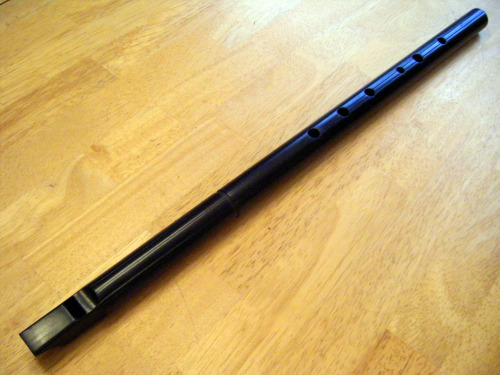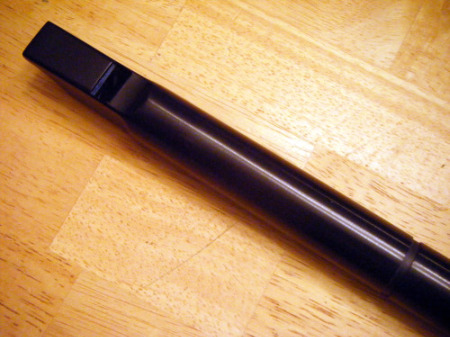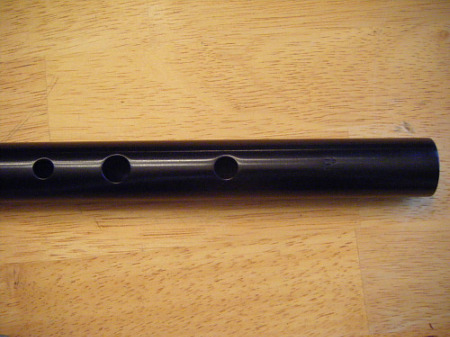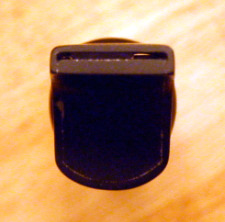Maker - Overton (Colin Goldie) www.colingoldie.de
Material - Aluminum
Dimensions: Length - 21 1/2"
Distance between 1st and 3rd bottom holes - 2 7/8ths"
Diameter of 2nd hole from bottom - 7/16ths"
Bore - 7/8ths"
Weight - 6 oz
Price at time of review - 216 euros direct from Maker for non anodized model
This
Whistle review is long overdue, and I write it with a large sense of
relief and aleviation of guilt. Building and maintaining this website
has been more work than anticipated, but has also been mostly a positive and
rewarding experience. One exception has been the amount of grief I have
caught and disgruntlement I seemed to have caused with my review of the
Bernard Overton short reach low D I posted a few years back. It seems
that Overton fans are a passionate lot, and for good reason as you will
see below. While I stand by my comments and opinions of that specific
whistle, I have since owned and played numerous other Overton whistles
in several different keys made by both Bernard Overton and Colin
Goldie. And the conclusion I have come to is that while almost all of
them have had that awesome signature Overton sound, in every other
aspect it is rare to find two Overtons that are exactly alike. While
you might assume this is a bad thing, perhaps pointing to
inconsistancy, in the case of Colin Goldies whistles, this is most
certainly Not the case. Colin Goldie is a master whistle maker in every
sense of the word. His knowledge, experience and skill at whistle
making is such that he has complete control over almost every aspect of
his whistles, and therefore can and does customize the whistles he
makes for people according to their individual prefreneces in regards
to backpressure, volume, tone and responsiveness. This of course leads
to there being large variations between any given Goldie made whistle
one might run across, and makes it hard if not impossible as a reviewer to give a review
that would encompass these whistles as a whole.
I must also start by pointing out that Colin Goldie and his wife Brigitte are good people, period. Buying a Goldie whistle is a very personable, enjoyable and positive experience. Brigitte is always quick to respond to emails, and Colin is always ready to spend hours on the phone talking about every aspect of these metal tubes we have all come to love. They are always in close contact with you throughout the process of ordering your whistle. Colin works hard to figure out what exactly it is you are looking for in a whistle. Both times that I have ordered a whistle direct from him, he has ended up making several whistles which he then played over the phone for me so that I could choose which one I liked the sound of best (which was hard as they all sounded great. By the way, Colin is also an awesome whistle player as well as maker). Brigitte then kept me informed of my whistles progress as it made it's way across the pond as it were and through the black hole of US customs. The experience dosen't end there however, as Colin wants to make sure you are 100% satisfied with your whistle and is more than happy to take it back for more tweaking or even exchange for a new one until you are completely happy with your new whistle.
That being said, ironically I obtained the whistle I am reviewing here second hand off the Chiff and Fipple whistle forum. Also of note is that as of August of 2009, Colin stopped making whistles under the brand name of "Overton" and started making and labeling them under the name "Goldie". This whistle was made prior to that and therefore is stamped as an Overton. And lastly on a side note, the way to tell the difference between a Goldie made Overton and one made by Bernard, is that Colin signed his whistles on the inside of the bottom of the tube/body of the whistle.




I must also start by pointing out that Colin Goldie and his wife Brigitte are good people, period. Buying a Goldie whistle is a very personable, enjoyable and positive experience. Brigitte is always quick to respond to emails, and Colin is always ready to spend hours on the phone talking about every aspect of these metal tubes we have all come to love. They are always in close contact with you throughout the process of ordering your whistle. Colin works hard to figure out what exactly it is you are looking for in a whistle. Both times that I have ordered a whistle direct from him, he has ended up making several whistles which he then played over the phone for me so that I could choose which one I liked the sound of best (which was hard as they all sounded great. By the way, Colin is also an awesome whistle player as well as maker). Brigitte then kept me informed of my whistles progress as it made it's way across the pond as it were and through the black hole of US customs. The experience dosen't end there however, as Colin wants to make sure you are 100% satisfied with your whistle and is more than happy to take it back for more tweaking or even exchange for a new one until you are completely happy with your new whistle.
That being said, ironically I obtained the whistle I am reviewing here second hand off the Chiff and Fipple whistle forum. Also of note is that as of August of 2009, Colin stopped making whistles under the brand name of "Overton" and started making and labeling them under the name "Goldie". This whistle was made prior to that and therefore is stamped as an Overton. And lastly on a side note, the way to tell the difference between a Goldie made Overton and one made by Bernard, is that Colin signed his whistles on the inside of the bottom of the tube/body of the whistle.




Appearance:Unfortunately,
Colin is not currently offering anodised, colored models
at the moment, which is to bad as they look quite sharp. This whistle
otherwise features the tried and true standard original basic overton
design, which has become the iconic look of low whistles. I especially
like the construction of the tuning slide/mechanism being inside the
whistle, as this maintains the sleak lines and look of a non tunable
model, in comparison to the common cuff or sleave on the outside often
seen on other whistles. The tuning joint is held together using
plummers teflon tape, which works fine but can wear out with prolonged
use and may need to be replaced. However, this is not overly difficult
to do oneself and should not require a trip back to the makers. The
only slight aesthetic defect on this whistle is a spot on
the underside of the mouthpiece where the anodization (is that a word?)
didn't seem to take. Luckily it is not in an overly noticeable spot. As
previously stated, Colin is a master craftsman/whistle maker, and this
whistle looks and feels professional and well built.
Tone: Some astute whistler, or perhaps a poet who will live forever in infamy, came up with the perfect descriptor for the distinctive tone of Overton whistles, calling it the "Cosmic Drainpipe" sound. This of course is one of those phrases that only makes sense after you've actually heard one, making it somewhat limited in usefulness when trying to describe the sound to someone who hasn't (Of course once you have heard one, you will realize that cosmic drainpipe is the perfect moniker!)
The second octave of this whistle is pure and sweet, while the first octave has the signature Overton complex, resonant reedyness. The low fundamental note is also nice and full and resonant. All notes contain a pretty good dose of chiff.
Volume: I would describe the volume of this whistle as being fairly loud in comparison to other Low D's I have played. It is also fairly well balanced, with the second octave only slightly louder than first. I would think this whistle would more than hold it's own in a session environment, provided you ever had the need for an Eb whistle in a session!
Backpressure/air requirement: If I were to classify the amount of backpressure on this whistle compared to others, I would say it had a moderate amount, but I know Colin Goldie would consider it to be what he refers to as an "easy blower". (I have played a whistle that he considered to be a medium blower, which I in my experience would have constituted to have a farily high amount of backpressure. I can't imagine what his hard blower would be like! But again, where Colin can customize the amount of backpressure a whistle has when making it, this is a non issue) Air requirement is moderate to low, and none of the notes break overly easily.
Responsiveness: This whistle is perfectly responsive, with ornaments crisp and snappy the way I like them. Tounged notes also pop with a nice burst of chiff. It also transitions between octaves fairly smoothly, with no notes requiring any unusual attention.
Clogging: This whistle cloggs pretty consistantly unless you warm it up first, but once warmed up it stays relatively clear. If I ever had to use this whistle for an extended period of time, I would probably give it a duponol treatment to be safe.
Tuning: All notes fell within a 10 cent tolerance of true, which as is usually the case, can be manipulated/effected depending on how hard one blows. The only two small anomalies are that the low F is slightly sharp (but still within 10 cents) where as everything else was either right on or slightly flat, and the Db cross fingering is OXXXOX, rather than OXXOOO or OXXXOO.
Sound clip:
Summary: As you may have surmised by now, I have certainly found an Overton that works for me with this one, and as such this is definately a six holer for me! And I am confident that anyone who takes the time to work with Colin Goldie and lets him know what they want in a whistle, (and you have to know what you want in a whistle mind you, something I wasn't entirely sure of myself, much to Colins frustration I'm sure!) could have their own personal "six hole", gift from God whistle as well.

Tone: Some astute whistler, or perhaps a poet who will live forever in infamy, came up with the perfect descriptor for the distinctive tone of Overton whistles, calling it the "Cosmic Drainpipe" sound. This of course is one of those phrases that only makes sense after you've actually heard one, making it somewhat limited in usefulness when trying to describe the sound to someone who hasn't (Of course once you have heard one, you will realize that cosmic drainpipe is the perfect moniker!)
The second octave of this whistle is pure and sweet, while the first octave has the signature Overton complex, resonant reedyness. The low fundamental note is also nice and full and resonant. All notes contain a pretty good dose of chiff.
Volume: I would describe the volume of this whistle as being fairly loud in comparison to other Low D's I have played. It is also fairly well balanced, with the second octave only slightly louder than first. I would think this whistle would more than hold it's own in a session environment, provided you ever had the need for an Eb whistle in a session!
Backpressure/air requirement: If I were to classify the amount of backpressure on this whistle compared to others, I would say it had a moderate amount, but I know Colin Goldie would consider it to be what he refers to as an "easy blower". (I have played a whistle that he considered to be a medium blower, which I in my experience would have constituted to have a farily high amount of backpressure. I can't imagine what his hard blower would be like! But again, where Colin can customize the amount of backpressure a whistle has when making it, this is a non issue) Air requirement is moderate to low, and none of the notes break overly easily.
Responsiveness: This whistle is perfectly responsive, with ornaments crisp and snappy the way I like them. Tounged notes also pop with a nice burst of chiff. It also transitions between octaves fairly smoothly, with no notes requiring any unusual attention.
Clogging: This whistle cloggs pretty consistantly unless you warm it up first, but once warmed up it stays relatively clear. If I ever had to use this whistle for an extended period of time, I would probably give it a duponol treatment to be safe.
Tuning: All notes fell within a 10 cent tolerance of true, which as is usually the case, can be manipulated/effected depending on how hard one blows. The only two small anomalies are that the low F is slightly sharp (but still within 10 cents) where as everything else was either right on or slightly flat, and the Db cross fingering is OXXXOX, rather than OXXOOO or OXXXOO.
Sound clip:
Summary: As you may have surmised by now, I have certainly found an Overton that works for me with this one, and as such this is definately a six holer for me! And I am confident that anyone who takes the time to work with Colin Goldie and lets him know what they want in a whistle, (and you have to know what you want in a whistle mind you, something I wasn't entirely sure of myself, much to Colins frustration I'm sure!) could have their own personal "six hole", gift from God whistle as well.